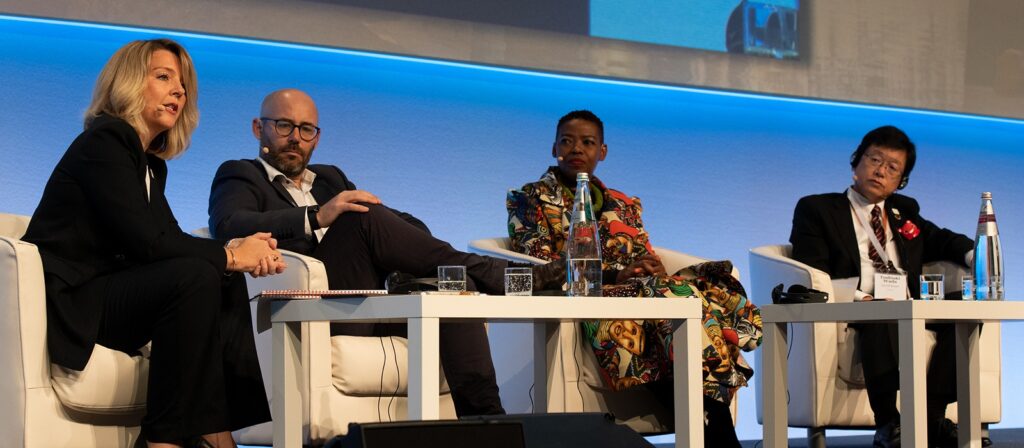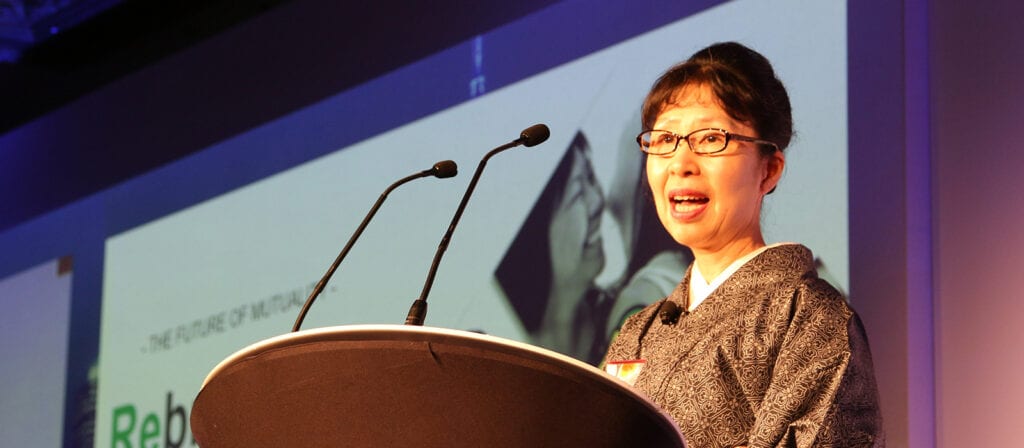CO-OP Kyosai consists of 149 regional consumer co-ops, 212 university co-ops and three federations.
- Regional consumer coops: Located in all prefectures, and about 39% of Japanese households, or about 23 million people, are members. Consumers’ coops in Japan were established throughout the country in the 1960s, when the consumer movement was heightened due to pollution problems, rapidly rising prices, harmful additives and other issues. Cooperatives were set up by consumers themselves, mainly mothers who wished for the safety and security of their families. Currently, coops across the country are engaged in a wide range of businesses, including medical and welfare services as well as retail business. They are involved in a variety of businesses, which are very close to their members, mainly supermarkets and delivery services. The home delivery is a unique system: the same driver visits on the same day every week, at the same time, the same member’s house and delivers the products ordered the previous week. This creates very close personal relationships.
- University coops: There are 212 university co-ops with more than 1.5 million members nationwide. The point of contact for cooperatives is the coop staff at each region and university who are close to the members. In Japan, the law prohibits non-members from using cooperatives. University coops provide comprehensive support for university life as well as shops and cafeterias at each university. One such wide-ranging business is CO-OP Kyosai.
CO-OP Kyosai reflects the changing needs of its members by its proximity to them
The home delivery and shop staff see their customers weekly and listen to their feedback directly. It is because their staff are closely involved in the lives of their members that they are able to receive and develop members’ honest opinions, while informing them of the guarantees that are useful for their lives.
When CO-OP Kyosai was founded in the 1980s, life insurance was generally perceived as something for men who supported the family budget to take out expensive death benefits, rather than something for women and children to actively take out.
However, if a woman or child is hospitalised due to illness or injury, it costs money and is hard on the family. A new CO-OP Kyosai has been created for women and children, focusing on members’ wishes for affordable medical cover that is easy on the family budget, as well as coverage for hospital visits for injuries that are common among children.
CO-OP Kyosai started with a monthly premium of 300 or 400 yen ‘a cup of coffee’s worth of premiums’. CO-OP Kyosai was born from the voices of its members, and they receive around 300,000 comments a year from members. More than half (180,000) of them are from people who are thankful for CO-OP Kyosai.
They also take member enquiries, opinions, requests and complaints seriously and use them to revise their products and improve services.
Listening to the voices/opinions of staff
The voices of all staff, including call centre operators, staff of the CO-OP Kyosai and staff of all coops in Japan who are in daily contact with members, are registered in the Member’s Voice Management System. This member feedback is shared with executives and relevant departments on a regular cycle to improve products and services.
Coverage for women and children
In the 1990s, the state-provided health insurance system in Japan was overhauled and the amount of out-of-pocket medical costs for citizens was raised. For women, who make up the majority of coop members, the need for medical cover increased.
In response to this, CO-OP Kyosai developed the Women’s Product Range in 1998 as part of its main product range, the “Save-Anyone”.
The Women’s Product Range had a special clauses based on the risk of illnesses specific to women and more generous hospitalisation cover for illnesses common to women.
It covers malignant neoplasms specific to women, such as breast cancer and cancer of the uterus, as well as illnesses related to pregnancy and childbirth.
The Women’s Product Range, which can be joined even during pregnancy, still enjoys the support of many members, with 1.65 million members enrolled as of the end of FY2021.
In addition many members and staff of member coops have continued to request “coverage for children who can join with little notice”.
The coop staff, who reflect the voices of their members, continued to raise their voices nationwide for “coverage that more children can join”, and finally a new product offering far better coverage was launched in 2010.
Case Study One: Coverage for existing health conditions in children
The mother of a baby with congenital heart disease couldn’t get cover for him but remembered that the Coop also had a mutual aid scheme, so she wrote a letter to them.
The person in charge of the local coop, who received the letter, asked if the letter could be included in a leaflet to be distributed to other members, in order to spread the word.
Subsequently, following the feedback of this and many other members, a revision was finally made. This member who raised his voice was also contacted by the regional representative and his son also joined the scheme.
Once the product matures, regardless of health status, the child can be transferred to the same adult course as other children, and the peace of mind continues thereafter.
The product steadily expanded in popularity in its circle of subscribers, reaching more than 20 000 in about a year. It is a product that truly symbolises mutual aid insurance, which is a mutual aid between members.
Case Study Two: Coverage for an aging society
Developing products for an ageing society is also critical. As the average age of their members exceeded 50, ageing became increasingly recognised as an issue. There was a growing concern that life and medical coverages would be interrupted in the middle of their lives.
Until then, the main products were one-year renewal products maturing at age 65 and term life assurance products with 10-year renewal and maturity at age 80, but in 2012, after a series of product design innovations, they finally released a whole life assurance product.
Japan has become the first country in the world to enter the super-aged society, with an ageing population rate of over 23%. The number of subscribers has steadily increased, and as of March 2022, over 600,000 people had subscribed to whole life medical and 130,000 to whole life.
The examples introduced so far are just some of the product revisions and product development that are unique to CO-OP Kyosai. The member feedback is their driving force, and their complaints, opinions and requests are a guide to help them move forward.
It is CO-OP Kyosai’s mission and their engagement with their members to:
- listen carefully to their voice,
- find out what they want and reflect it in their products and services.
By continuing to enhance their coverage and services they have been recognised by Japan’s largest customer satisfaction survey, the JCSI (Japanese Customer Satisfaction Index) in fiscal 2021. They were rated No. 1 in customer satisfaction in the life insurance sector.
Future Plans: Student Comprehensive Mutual Insurance
University coops operating on campuses were severely affected by the Covid-19, as students were mainly taking online classes. In order to ensure the stable management of the University Co-operative Mutual Insurance Federation’s Student General Mutual Insurance, CO-OP Mutual Insurance took over the Student General Mutual Insurance business of the University Co-operative Mutual Insurance Federation.
Student Comprehensive Mutual Insurance has a 40-year history. CO-OP Kyosai will take over the business in October 2022. University and vocational school students who do not have a university cooperative can now join a comprehensive student mutual aid scheme if they join a local cooperative.
Through cooperation between CO-OP Kyosai, university coops and local coops, they will expand the circle of membership to more young people, deliver peace of mind and link coops to the future.
CO-OP Kyosai and the SDGs
The CO-OP Kyosai Co-op is making a significant contribution to the SDGs ‘leaving no one behind’ by continuing to listen to the voices of their members and addressing their problems. In addition to the SDGs, Kyosai Co-op, together with its member cooperatives nationwide, is also seriously tackling the SDGs.
These are just a few examples, but we would like to continue to implement initiatives in various fields that only a federation can undertake and support the activities of coops across Japan.
They will continue to cooperate with cooperatives across the country, listen to their members, face social issues and continue to contribute to their members and local communities.





